Basics of the education system in New Zealand
The New Zealand education system is distinguished, first of all, by strict government regulation. A similar trend can be observed, by the way, in Australia. Since New Zealand is part of the British Commonwealth, its education system is close to that of England. Almost all members of this Commonwealth have certain unified principles of approach to its organization. Despite this, there are many national differences that characterize the educational system in New Zealand.
There are five levels of education in the country . The first can be considered preschool institutions, which children attend until they are 5 years old. At the age of 5, a child first crosses the threshold of a primary school, where he studies until the age of 12. From this age, the young New Zealander becomes a student at Secondary school, which he leaves as a graduate at the age of 18. The second and third levels of education are compulsory. Attending a kindergarten is recommended, but the final decision is up to the parents, who can leave the preschooler at home. This is followed by a secondary vocational school (Polytechnics) and a higher school (High education). The last two levels are, of course, optional.
As you can see, the New Zealand education system is in some ways even similar to the Russian one, but if we try to delve into the details, we will see some fundamental differences.
Preschool education
Kindergartens (kindergartens) in New Zealand are a fairly developed network of preschool institutions. Almost all of them are in private hands. The state has introduced a system of subsidies and subsidies for such institutions, so they are only relatively private, since the share of state funding is quite large. In addition, the state issues quotas for the opening of such establishments, trying to wisely distribute them across the territory of the country, which, in principle, is very unevenly populated. Therefore, the number of kindergartens is directly proportional to the population of a certain area. Moreover, almost all parents can send their children to them.
Kindergartens in New Zealand are privately owned
The main purpose of a kindergarten is to look after children in the absence of parents. They do not work all day, but only from 9 to 15 hours of the day (in the vast majority). The extended day group works until 18:00, but such groups are not available everywhere. Perhaps some compatriots will be surprised by such rules, but for the uninformed, it should be said that the working day in New Zealand usually begins at 9 am and lasts until 16 o'clock. But most employees leave their workplace much earlier. Strange, but this attitude towards work in no way affects the rapid growth of the New Zealand economy and GDP per capita.
Children in kindergartens do not receive hot meals, and teachers warm up for them in microwaves what their parents have prepared for them. There is one afternoon snack per day, which is paid for by the owner of the preschool institution. Children of foreigners who legally reside in New Zealand can attend child care for a maximum of 20 hours per week free of charge. If the child stays there longer, then his parents will have to pay for the time exceeding the limit at a rate of at least three New Zealand dollars per hour. The maximum hourly rate is NZD 6.00. The price is directly tied to the level of the kindergarten and the number of services provided.
The teachers read books to the children, tell them fairy tales, and go for walks with them. There is no compulsory educational program. But the administration of the kindergarten bears full responsibility for the children who are there. Therefore, in preschool children's institutions, the stay of children is strictly regulated by internal regulations, and the state monitors compliance with these conditions.
Getting basic education
There are four types of schools in New Zealand:
- General education.
- Schools that teach in the New Zealand Aboriginal Maori language.
- Institutions for children with special needs.
- Remote ones, which are intended for those New Zealanders who live in remote or inaccessible areas of the island state.
Transferring a child from one school to another is not difficult. Just like changing its type if there are objective circumstances for this.
Education at mainstream schools (primary and secondary) is compulsory for all New Zealand citizens. For children of foreigners who legally reside in the country, such a rule does not exist in local legislation. They can be accepted both into New Zealand schools, which are subordinate to the state, and into private ones.

In elementary school everything is very democratic and relaxed
Unlike Russia, classes in New Zealand schools begin in February, and the end of the school year falls in the last month of the year - December. During this period, children can take three holidays: Easter, summer and Christmas. Summer holidays last the longest - about two months. The duration of the rest is two weeks.
We should not forget that New Zealand is located in the Southern Hemisphere and therefore, when we have severe February frosts, New Zealand schoolchildren cheerfully go to the first day of classes in shorts. After all, in their country, February is the height of summer.
Primary school education
The duration of primary school is eight years. New Zealand children first enter school at the age of five or six (at the parents' discretion). During the first two years, teachers teach children the basics of counting, writing and reading. Everything happens unobtrusively and without grading. And already in the third grade, almost all basic disciplines are introduced. These include English and Māori, mathematics, science, physical education and art. Although elementary school teachers do not give grades, once every six months they are required to prepare a detailed report to parents about the progress and achievements of their children. The highest grade is considered to be A, the lowest is E. In elementary school, children are not given homework assignments. Almost all learning takes place during the educational process within the school.
First stage of secondary school
New Zealand students transfer to secondary school after finishing primary school. There is no need to take either final or entrance exams. At the time of admission, students are usually 12–13 years old.

The transition to high school is smooth
The duration of the first stage of secondary school is three years. This is the period of study from grades 9 to 11. The first year is characterized by a smooth transition from the elementary school system and regime to more stringent rules. Basic disciplines continue to be the basis of education; homework is completed and submitted for testing at the request of students. At this stage of education, the level of training of schoolchildren is much lower than, for example, in Russian institutions. This is why New Zealand secondary schools are often criticized by immigrants from the CIS countries.
In 11th grade, students can experience the rigors of high school. They need to orient themselves in their future profession and show a desire to study 6-7 basic disciplines in the humanities or technical fields. After completing their studies in the 11th grade, graduates must pass exams, based on the results of which they are awarded a qualifying degree corresponding to the first stage (basic secondary education).
Senior secondary education
After completing grade 11, many young New Zealanders decide to complete secondary education. And the vast majority of them are. Senior secondary school includes grades 12 and 13, which fully corresponds to British A-Levels courses. The only subject that students are required to study during this period is English. The rest are chosen by the children themselves. The choice is based on the student’s abilities and inclinations. The decision is made by parents based on interviews with specialized teachers, as well as conversations with the children themselves.
The final year of high school ends with final exams. They are taken in the main disciplines that the students took, and will be different for almost each of them. The exams, which are taken after grade 13, are also entrance exams to New Zealand higher education institutions. Those who particularly excel in the exams can receive a cash bonus from the New Zealand state to continue their education at university.
New Zealand's national secondary education curriculum places particular emphasis on foreign languages, mathematics, science and physical development.
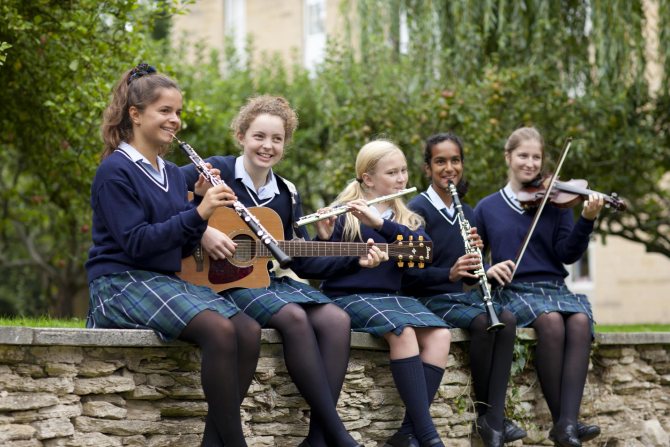
The New Zealand school provides every opportunity for the realization of children's inclinations. They have sections for music, dance, programming, web design and others. Great importance is attached to the development of students’ abilities, since teachers see this not just as a hobby for children and adolescents, but also as a professional orientation.
There are 440 comprehensive schools in New Zealand in 2021. Of these, two dozen are not under government control and belong to private individuals. New Zealand schools can be either single-sex (separate for boys and girls) or co-ed.
I am currently taking English courses at the Concordia Institute of Business. I really liked the learning process, which often takes place in a playful way and time flies by. Also, the teachers here are from different English-speaking countries, which is a big plus, since during the learning process you begin to understand different accents of the English language.
Igor
https://otzovik.com/review_34947.html
Most of the 20 private schools are run by religious organizations and are therefore segregated. There are also secular secondary educational institutions. Immigrant children have access to not only public but also private schools. You can enroll in it at almost any age. The decision to enroll in such a school is usually made by parents. But according to New Zealand law, teenagers can live independently from the age of thirteen without parental care. To enroll in a private or public school, foreign citizens must submit a statement indicating the grades in subjects received in the previous school of study. If a foreign child’s level of knowledge of English, in the opinion of the administration, is insufficient, then he will be sent to specialized linguistic courses operating at schools (High School Preparation).

In New Zealand it is customary to wear a school uniform
Private schools usually have comfortable dormitories for students, including foreign ones. Each room usually accommodates two or three people. Naturally, boys and girls are located in different buildings. The territory is well guarded, there is free internet, lounges and even small cinemas.
Education at a private school is quite expensive, its cost varies from 8 to 10 thousand New Zealand dollars per year.
New Zealand dollar to American dollar exchange rate: 1 NZD = 0.72 USD.
If we are talking about children of foreign citizens who study in public schools, then parents will have to pay about 1,000 New Zealand dollars for their studies during the year. These funds will be used to purchase textbooks and teaching aids, pay for security services and create a school fund. Children of immigrants whose parents are not currently in the country usually live with New Zealand families, which will cost their parents 200–300 local dollars per month. They must be provided with separate rooms and all household supplies, which is strictly controlled by the state inspectorate for supervision of educational institutions.
New Zealand Vocational Education Structure
The main feature of education in the “land of kiwis” is its division into ten levels.
Up to the fourth level (Certificates Levels), you can receive a certificate of completion of the training program (from three months to two years) in the chosen direction - this will correspond to primary special education. Higher levels (fifth and sixth) require a diploma, which is comparable to secondary vocational education in Russia.
But the programs from the seventh level and above are of greatest interest, since they allow you to obtain not only a prestigious academic degree from bachelor to doctor of sciences, but also a work visa immediately after graduation.
It is also possible to obtain it by successfully completing the program at previous levels, but instead of 30 standard weeks of training at levels seven to ten, it will be 60 weeks.
Young Entrepreneurs Young Awards 2021. Apply now.
When choosing a program of study in New Zealand, it is important to look at the level (NZQF) that will be achieved after graduating, as well as the type of qualification - certificate, diploma or degree. Detailed information about each level of education is available on the New Zealand Qualifications Authority website.

Photo: Unsplash
Most educational institutions in New Zealand are located in Auckland, and the most prestigious is The University of Auckland, where for 29-77 thousand New Zealand dollars a year you can study in various fields - from engineering and medicine to entrepreneurship and art.
Required documents and exams for admission
For admission, you must provide documents that confirm your education (certificate, diplomas). It depends on the chosen educational institution what entrance exams and documents the admissions committee will require - this could be a student’s resume, a motivational essay, a current portfolio of work, or an interview.
The most important exam, without which no admission can be completed, is IELTS (International English Language Test).
To enroll in an educational program of the seventh level and bachelor's degree, you need to score at least five and a half points in each section (total score not lower than six), for eighth level programs a higher result is required - from six points in each section and a total score of at least six and a half. Levels four to six programs require IELTS scores of five and a half points.
Where to take IELTS?
Now IELTS can be taken in many countries in more than 900 centers - their addresses are available on the official website. Russian students can also find test schedules in the nearest city there.
The cost of taking IELTS is about $250 (the exact cost depends on the specific center).
What's the best way to prepare?
You can prepare for the test yourself using the necessary textbooks and online resources (for example, British Council and IELTSorg), which contain all the necessary information about the main test. Less expensive but effective methods are language courses, classes with tutors (for example, via Skype) and preparation for taking IELTS abroad.
Some universities even offer the opportunity to take language courses for free, provided that the applicant then enrolls to study with them.
Analogues of IELTS
TOEFL, Cambridge or PTE results are also accepted for admission and visa purposes. A table of the minimum scores or grades for each test that qualify a student for admission to each level of the educational program is presented on the New Zealand Qualifications Authority website.
Secondary vocational education
Secondary education is very common in New Zealand and Australia. Vocational and polytechnic colleges are very popular among local youth and immigrants. The duration of college studies ranges from six months to two years. For admission you need a good knowledge of English and a certificate of secondary education. After graduating from a vocational college, you must pass final exams. Based on their results, a certificate of the acquired specialty or a professional diploma is issued. Studying in the first year of college is equivalent to the first year of university. Therefore, after a year of study at a vocational college, it is quite possible to enter the second year of university. To do this, you must pass an intermediate exam, the results of which will become the basis for admission to the second year of university in your chosen specialty.

A large percentage of New Zealand school graduates continue their studies
New Zealand today has 25 vocational colleges, with approximately 30,000 students. Their graduates can find work not only in their home country, but also in Australia. Therefore, in New Zealand there is a demand for training not only in those specialties that are required directly in this state, but also in those that are needed in the neighboring mainland country.
About the country itself, I can say that, in my opinion, it’s worth going there either to retire (to slowly live out your last days) or with families, and for young and energetic Russians (our people are different from foreign eccentrics (listen to Zadornov =))) to do there nothing. Time itself seems to flow more slowly. Many work only half a day and live comfortably. Everyone does everything slowly. Nobody is in a hurry.
Nikolai
https://otzovik.com/review_34947.html
Studying at a New Zealand college for foreigners who legally reside in the country is practically free. Its cost does not exceed one and a half thousand in local currency, which by New Zealand standards is simply a meager amount. Students will have to pay for course materials, room and board. Some public colleges provide boarding houses for students, the cost of living in which is minimal.
Formally, the head of New Zealand continues to be the British monarch. Until 1907, the country was part of the British Empire. Today the country is pursuing an independent and pragmatic policy aimed at enhancing its international image. But ties with the de facto former metropolis remain very strong. Just like the orientation towards the British model of education.
Massey University, Palmerston North
Programs:
English language courses, university preparatory courses, bachelor's, master's, doctoral, distance learning
Number of :
36,000 students, including more than 4,300 international students from 100 countries
Campuses : Auckland, Wellington Status: public Faculties: business, art, medicine , Humanities and Social Sciences, Science, Institute of Education, School of Aviation, School of Engineering and Advanced Technology, Institute of Veterinary Science and Biomedicine, Institute of Agriculture and Environment
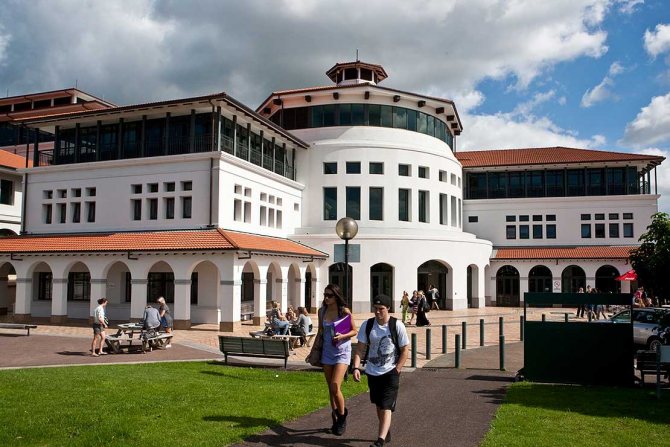
Massey University, Auckland Campus
Interesting Facts
- The university was founded in 1927
- New Zealand's only multi-campus university
- One of the largest business schools in the country and the only university with its own stock exchange for students
- Won 17 national teaching awards over the past 13 years
- The first New Zealand university to join an international consortium offering courses online. Leader in distance and blended learning. More than 250,000 students in 50 years of distance teaching
- A leading university with government-funded research centers
- The most prestigious design school, whose students regularly win awards
- 218 partner universities around the world
- The only veterinary faculty in the country with a teaching hospital
- New Zealand's only university aviation school
Rating
#332
in the QS World University Rankings®
#1
in New Zealand and
top 50
in the world for Agriculture
Top 100
Art and Design, Nursing, Veterinary Science, Agriculture and Forestry
Top 300
disciplines in the QS ranking: Education, Accounting and Finance, Geography, Statistics, Psychology, Sociology, Business and Management, Economics and Econometrics, Chemical Engineering, Ecology, Linguistics, Biology, Mathematics
Find out about tuition fees for foreign students : undergraduate, postgraduate
______________________________________________
Higher education system
There are two types of higher education institutions in New Zealand: universities and polytechnics.
Universities can provide an academic level of education. The vast majority of them were founded and have been operating since the times when the country was a dominion of Great Britain. The whole world knows the quality of education that English universities can provide. The New Zealand system took all the best from the English one.
In most universities in New Zealand, the academic year begins in March. It ends at the end of November. In December, January and February, students are on vacation. The academic year consists of two semesters. In between there are holidays that last two weeks.
The knowledge assessment system vaguely resembles the domestic one. During the academic year, students take exams twice (analogous to the sessions familiar to Russian residents).

Students from different countries come to New Zealand, because studying here is not very expensive, and English is widely spoken all over the world.
Today, more than 120 thousand students study at New Zealand universities. Among them there are many people from the CIS countries. Every year, about 30 thousand foreigners join the student ranks.
There are eight universities in New Zealand: University of Otago, University of Auckland, University of Canterbury, Lincoln University, University of Waikato, Massey University, Victoria University, Auckland University of Technology.
The first university to operate in New Zealand about a century and a half ago was the University of Canterbury. It was founded in 1873 by two professors from Cambridge and Oxford.
New Zealand's largest university is Massey University. Its listeners are more than 33 thousand New Zealand and foreign students.
New Zealand universities provide training in a wide range of specialties. But each of them has its own peculiarity. For example, the Faculty of Medicine at the University of Otto is widely known, and the University of Canterbury trains highly qualified specialists for the agricultural sector of the economy. The University of Lincoln is well-trained for future managers of commercial organizations, and the University of Auckland produces excellent architects.
For a bachelor's degree, you must study at any New Zealand university for at least three years. Completing a bachelor's degree with honors will require another year of study. It gives you the right to receive a master's degree in just one year, instead of the usual two. New Zealand and Australian employers are accustomed to giving priority to candidates for vacancies who have not just higher education diplomas, but also good grades in them. If, for example, in Russia a manager simply wants to see a certified specialist, then New Zealand and Australian employers prefer specialists who have particularly distinguished themselves while studying at universities. All other things being equal, holders of New Zealand equivalents of Russian “honor diplomas” have priority in employment.
Students must study for a master's degree within two years after receiving a bachelor's degree (except for holders of a bachelor's degree with honors). There is a master's degree in every New Zealand university.

Holders of a BA Honors degree will have an advantage in employment in New Zealand
There is also a higher doctorate degree, which requires an additional three years of postgraduate training. This is an analogue of domestic graduate school. After completing the postgraduate course, a dissertation defense will be required. The PhD degree is highly respected in English-speaking countries.
The level greatly depends on the university (as everywhere else) and on whether it is the main campus or a branch (probably the same as everywhere else). Auckland, New Zealand's largest city, has Auckland University, which is ranked in the top 100 in the world. Naturally, the cost greatly depends on the level of the educational institution.
Angelica
https://studyaway.ru/2016/10/angelica/
Education at New Zealand universities is conducted in English. Almost all of them have groups where disciplines are taught in the Maori language, which is officially the second official language in New Zealand. Finding a university with Russian as the language of instruction is almost impossible. Despite the fact that this direction is becoming increasingly popular among Russian applicants, in 2017 the total number of Russian-speaking students in New Zealand higher education institutions is still relatively small. The vast majority of foreign students come from Oceania and Indochina.
It is not possible to get a higher education in New Zealand for free, both for native New Zealanders and foreign students . But citizens of the country are provided with certain discounts and government loans for higher education. It is believed that getting a New Zealand diploma is much cheaper than an American or, for example, Canadian one.

Major universities in New Zealand have their own campuses
New Zealanders have traditionally been tolerant of foreigners. We should not forget that the country itself was created by immigrants from all over the world. The ancestors of the majority of today's citizens of this state once moved from Britain, France and Holland. But the descendants of the British are still much larger in percentage terms. New Zealand society is open, and therefore, if you wish, you can sooner or later fully integrate into New Zealand society.
There is no single cost of studying at universities; it all depends on the chosen faculty and specialty, as well as on the university itself. On average, to obtain a master's degree you will need to pay about 22-25 thousand New Zealand dollars for 5 or 6 years of study. A bachelor's degree can be obtained for 18 thousand NZD. This will be the fee directly for studying. Here you should also add the fee for living in a student dormitory, which is relatively small and amounts to about 100 NZD per month. Food in New Zealand is relatively inexpensive and environmentally friendly, so spending on it can be compared with similar expenses for students in Russia. Universities have student campuses. To stay there for a week you will have to pay about 120 NZD. Renting a small apartment in the city costs from 200 to 300 NZD and 150 NZD for utilities. In New Zealand, housing is usually rented on a weekly basis. Therefore, the rental advertisement indicates the amount of payment for this period.
New Zealand is often chosen for study by citizens of the USA, Canada or Great Britain. Education here is attractive due to its cost, since it costs one and a half to two times cheaper than in these countries. More than 70% of graduates of New Zealand higher education institutions continue their working careers outside of New Zealand.
Video: studying in New Zealand
Cost of studying in New Zealand
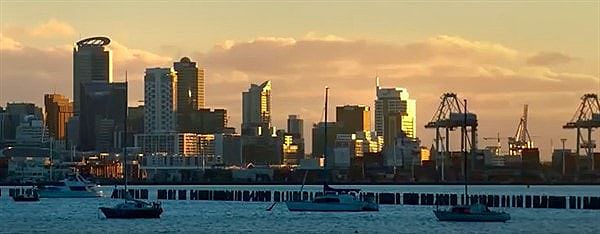
Living and studying at universities in New Zealand is very expensive. This is one of the few negative factors while studying in this country. The cost of some courses only increases every year. Each university sets its own tariffs, but the average varies between 18–25 thousand euros per year . Plus, to obtain a student visa you need to have at least 10 thousand euros .
When choosing a university, explore the possibility of foreigners receiving scholarships or grants. According to local laws, students are allowed to work no more than 20 hours a week during their studies and full time during the holidays. The cost of housing and other expenses largely depend on the city and the appetites of the individual student.
Renting a room in New Zealand privately will cost 400–500 euros per month . It's better to try to find a place in a hostel or rent a place with someone else. Many international students live with New Zealand families. In total, for a comfortable stay in New Zealand, you should expect an amount of 15–17 thousand euros per year .
Best Universities in New Zealand
University of Auckland
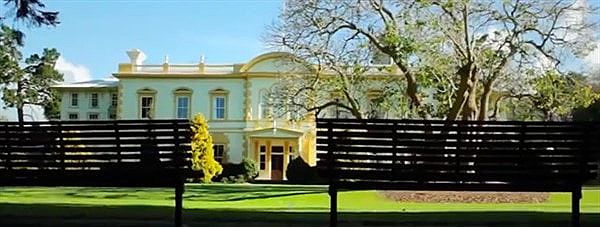
The most prestigious, largest and popular higher education institution in New Zealand, the University of Auckland was founded back in 1883. More than 40 thousand students study at 6 campuses of the university, concentrated in the center of the country’s largest city, Auckland, of which about 4 thousand are foreigners from 93 countries. The educational process is provided by 5 thousand employees. The structure of the university includes 8 faculties and 2 research institutes. Popular study programs include medicine, law, business, art, architecture and bioengineering.
Official website of the University of Auckland – auckland.ac.nz
University of Otago
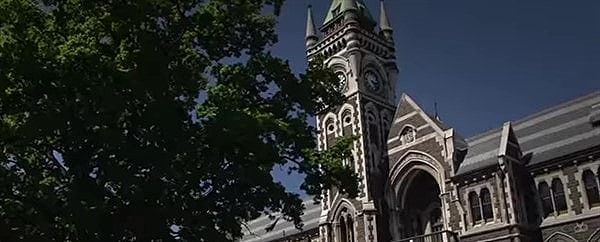
The oldest university in New Zealand, the University of Otago, located in Dunedin, opened its doors to students in 1869. It is considered the second most important higher education institution in the country after the University of Auckland. Training is conducted in 4 main areas - medicine, humanities, business and general sciences. Currently, more than 20 thousand students study at the university. In addition to Dunedin, the University of Otago has campuses in Auckland and Wellington. The university has 14 research centers.
Official website of the University of Otago – otago.ac.nz
University of Canterbury
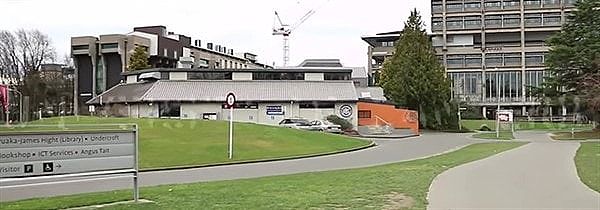
Another fairly old university in New Zealand, the University of Canterbury was founded in 1873 and is located in Christchurch. The number of students is up to 15 thousand people, of which about 1160 are foreigners. The university staff includes more than 1,800 employees. The university consists of 7 faculties with very diverse training programs. Popular ones include forestry, art, music, law, sports and coaching.
Official website of the University of Canterbury – canterbury.ac.nz
Language schools
There are several schools in New Zealand where a Russian applicant can significantly improve his knowledge of English and receive an appropriate international certificate.
All of these language schools, with the exception of the last one, are institutions of the first qualification category, while the latter belongs to the third. What does it mean? Without going into details, the pace and load on the listeners is minimal, but it takes longer to study. The low intensity of the educational process is subsequently compensated by deeper assimilation, which is simply vital for those who a priori do not have an inclination to study foreign languages. In addition, students of first category schools have the right to work part-time for 20 hours a week. The duration of the courses ranges from 14 to 24 weeks. Studying them will be the basis for opening a New Zealand visa. You can enroll in a school or course remotely. Teaching is conducted by native speakers, and students receive a fairly high level of training, which will help them when entering an educational institution at any level.
Table: New Zealand language schools and their tuition fees
| Name | Duration of training | Cost, NZD per week |
| Languages International | 23 hours a week | from 360 |
| NZLC (New Zealand Language Center) | 25 hours a week | from 280 NZD |
| Wilkinson's English Language School (part of Cornell Education Group) | 25 hours a week | from 230 |
| Edenz colleges | 20 hours a week | 210 (morning and evening classes) |
| 25 hours a week | 240 | |
| Aspire2 International | 23 hours a week | from 200 |
| Abacus Institute of Studies | 20 hours a week | from 180 |
| Regent International Education Group | 20 hours a week | from 200 |
Video: life in New Zealand
How can a Russian citizen enter a New Zealand university?
Is it easy to get into a New Zealand university? It turns out that not very much. Citizens of the CIS republics, including Russians, cannot apply to universities in New Zealand immediately after graduating from school. The reason for this is the difference in the duration of training. In New Zealand schools it lasts a year longer. Therefore, yesterday's school graduate needs to enter any institute or university in his country. After the first year, you can apply for admission to any of the universities in New Zealand. It is typical that New Zealand universities do not have entrance exams. Admission to students is carried out on the basis of a competition of documents received at the previous place of study. The decision is made by the university admissions committee on an individual basis; consideration of an application for admission sometimes lasts up to six months. In some cases, members of the admissions committee may ask the applicant to come for an additional interview.
Applications for enrollment must be submitted throughout the year before the start of studies; educational institution administrations stop accepting applications at least 2 months before the start of the academic year. If after 11th grade there is no opportunity or desire to stay another year within your home country, then you can move to New Zealand and enroll in preparatory courses that operate at any university. To enter there, a certificate and an international certificate of proficiency in English are enough. In this case, it is important to carefully assess your financial capabilities, since, as we can see, studying language courses in New Zealand is by no means the cheapest. The cost of preparatory courses at the university is slightly higher.
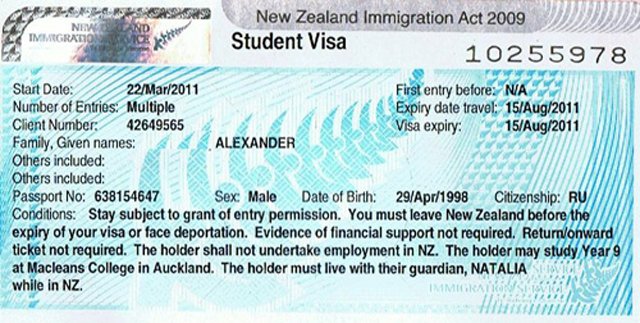
Based on admission to the university, future students apply for the appropriate type of visa
To visit New Zealand, citizens of the Russian Federation and neighboring CIS republics must obtain a study visa . This process takes at least two months, so you should contact the diplomatic mission of the island state in advance. To obtain an entry permit, you will need to submit a standard package of documents that is required when applying for a visa, as well as some documents required to open a student visa. The main one will be an official letter of invitation from a New Zealand educational institution, which confirms the student’s enrollment as a full-time student, indicates the specialty and faculty, the duration of study and its conditions. Detailed details of the educational institution itself are also required. An important document will be an extract from the applicant’s bank account, confirming the sufficient amount of funds that will be required to live in New Zealand. The lower threshold of the amount is established by law and is equal to 10 thousand New Zealand dollars per year. A bank statement can be replaced by a sponsorship letter from an organization or a letter of guarantee from the student’s parents.
Diplomatic mission specialists will want to see confirmation of the future student’s intention to return to his home country upon completion of his studies. This could be an official letter from a Russian employer, where he guarantees that the future specialist will be provided with employment after studying at a New Zealand university, documents that can confirm the availability of expensive real estate in Russia. These requirements are also relevant for residents of other CIS countries. There is no exact list of such documents, but their submission can significantly increase the chance of obtaining a student visa. As a rule, New Zealanders do not refuse student visas, but rare cases do occur.
Graduates of educational institutions from the island state can easily find work in a local or Australian company, and also soon receive New Zealand citizenship, since the years of study are fully counted towards the naturalization period. And these two factors are also important when Russians or citizens of other CIS republics choose New Zealand for further study and work.
Video: about the University of Ottago
How to enter a university in New Zealand
The first step to entering a New Zealand university begins with choosing a specific educational institution and program of study. The geographical location of the university is of great importance. It is worth considering that in large and densely populated cities of New Zealand, for example, Auckland or Christchurch, the cost of living is much more expensive. Carefully study the different options, pay attention to the list of programs offered, access to scholarships and other types of support for international students.

There is no single centralized system for admission to New Zealand universities. For detailed information, please contact the university directly through the official website . Be sure to visit the government education portal - studyinnewzealand.govt.nz. There is a lot of useful information here, especially for foreigners interested in studying in New Zealand. Including admission requirements, field of study selection and more.
General requirements for admission to a New Zealand university
- Knowledge of English at a level sufficient for study. As a rule, international certificates IELTS (6) and TOEFL (80) are accepted.
- A certificate of complete secondary education or a diploma of graduation from a foreign university. In each case, the documents must be recognized in New Zealand. Citizens of Russia or Ukraine will most likely need to take a special preparatory course - Foundation .
Some documents are sent electronically, while some translated and certified copies are sent only by mail. If all the requirements are met, the university sends the foreigner a letter confirming enrollment and detailed information about the start date of training and details for paying for the course. After transferring funds, you can apply for a student visa at the New Zealand diplomatic office in your country. Read more about New Zealand study visas here.
Internship
To date, there are no separate internship programs for Russian students in New Zealand, nor for New Zealand students in the Russian Federation. But students quite often (it all depends on their future profession) are required to undergo a paid internship at enterprises in an island country. Its duration is usually three months, sometimes the period can reach six months. During the internship, students receive a salary that is not much different from the salary of full-time employees.
Foreign students can legally work part-time, but not more than 20 hours a week during their studies. During the holidays, no one limits the time you can work part-time. Most often, students from abroad find employment in the service sector. Wages in New Zealand are at least 9 local dollars per hour of work, which is established by law.
List of Universities in New Zealand
New Zealand is “England of the South Seas”, this is what the British colonialists called this country many years ago. Today, we can notice the influence of England on New Zealand in such areas as: government (the reign of the Queen of England), architecture (Victorian buildings), education (high standards of teaching). Although there are only 8 public universities and 21 polytechnics in New Zealand, almost all of them were founded in the 19th century. However, the high quality of teaching at these universities allows them to rank among the 400th best public educational institutions in the whole world.
Despite the borrowed education system from Great Britain, prices in New Zealand are significantly lower than in Great Britain and other European countries. It is thanks to the global recognition of New Zealand education, as well as the affordability of tuition fees, that New Zealand universities have become a prospect and the first step towards an international career for foreigners. All universities in New Zealand are available to Russian students who are 18 years old, have 12 years of education, and have sufficient knowledge of a foreign language.
List of the best public universities in New Zealand 2015:
- The University of Auckland (University of Auckland)
- University of Otago
- University of Canterbury
- Victoria University of Wellington
- Massey University
- University of Waikato
- Lincoln University
- Auckland University of Technology (Auckland University of Technology)
In order to determine which New Zealand university is suitable and will meet your expectations, you must first determine what specialty you would like to receive. For your convenience, Logos Study Group managers have divided universities by specialty.
Humanities universities in New Zealand
Humanities education – stable knowledge and respected positions, the “golden mean”, providing the student with a wide choice of specialties and suitable professions.
Best liberal arts universities:
- The University of Auckland (University of Auckland)
- Victoria University of Wellington
- University of Otago
- University of Canterbury
- University of Waikato
- Auckland University of Technology (Auckland University of Technology)
New Zealand Institutes of Technology and Engineering Universities
This area is in demand among young professionals. Engineering and technical education opens students up to good career prospects and the experience of European specialists.
Top Engineering and Technology Universities:
- The University of Auckland (University of Auckland)
- University of Canterbury
- Victoria University of Wellington
- University of Otago
- Massey University
Medical universities in New Zealand
Medical professionals are considered among the highest paid workers. The state allocates a significant portion of the budget not only to the salaries of medical workers, but also provides medical institutions with the latest modern equipment and excellent working conditions.
Best medical universities in New Zealand:
- University of Otago
- The University of Auckland (University of Auckland)
- Massey University
- University of Canterbury
Science universities in New Zealand
Natural science education is an undeniable foundation and valuable knowledge for every person. This direction includes such areas of knowledge as physics, chemistry, biology, mathematics and others. Moreover, it describes structures, functions, cause-and-effect relationships and practically excludes the humanities and social sciences.
The best natural science universities:
- The University of Auckland (University of Auckland)
- University of Canterbury
- University of Otago
- Victoria University of Wellington
- Massey University
Social universities and management universities
An excellent destination for students wishing to achieve career success in business.
The best universities in this field:
- The University of Auckland (University of Auckland)
- Victoria University of Wellington
- University of Otago
- University of Waikato
- University of Canterbury
- Massey University
- Auckland University of Technology (Auckland University of Technology)
Art universities and design schools in New Zealand
Art courses in New Zealand, as in many countries, are popular with the most creative students. England of the South Seas inspires students to new creative ideas and creative achievements.
New Zealand art universities:
- Media Design School in Auckland (School of Design and Media in Auckland)
Is it possible to get a scholarship or grant?
Scholarships are available for foreign students. This issue is resolved autonomously by each institution of higher education, therefore there is no uniform size and rules for receiving them. Their number is quite limited, and only those students who have demonstrated a high level of knowledge and academic performance can apply for them. The scholarship amount will be 2-3 thousand New Zealand dollars throughout the academic year for the bachelor's level. When it comes to future masters, they can receive from 6 to 12 thousand New Zealand dollars per year.
Since New Zealand is interested in attracting a reserve of intellectuals for the development of the country, foreign students who have particularly distinguished themselves in scientific activities can count on government grants in the amount of up to 50 thousand NZD. But for this you need to show special achievements. This amount is paid one time. You can become a grant holder several times during your studies.








